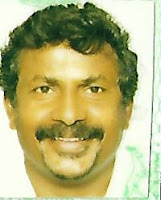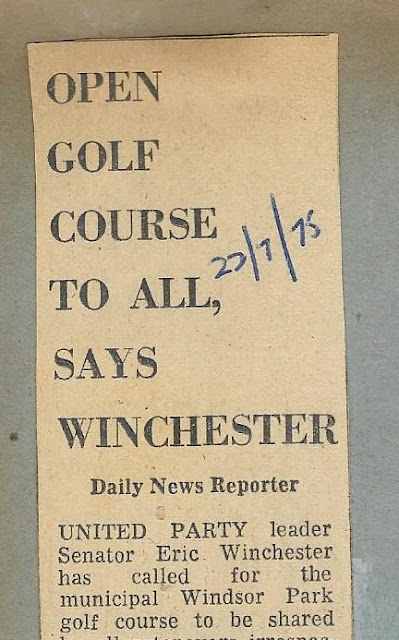Friday, July 31, 2020
THE BATTLES TO GET WINDSOR PARK GOLF COURSE OPEN TO ALL GOLFERS IN THE 1970s By Subry Govender
Twenty-six years into the new democratic and non-racial South Africa, many of us take the playing of a round of golf for granted.
Today we can just telephone any golf course and make a booking to enjoy the game. As long as you can pay the exhorbitant green fees, there will be no problems to play at Royal Durban, Durban Country Club, Mount Edgecombe, Selbourne, and other golf courses in KwaZulu-Natal or around the country.
But how many of us know about the struggles by black golfers and black golfing officials in the Durban area to utilise the municipal Windsor Park golf course prior to 1990?
How many of us recall the relentless battles that the black golfing fraternity had to take up since the early 1970s to get the former all-white Durban municipality to allow black golfers to also play at Windsor Park?
In this struggle the black golfing officials did find some support among a few councillors. But they too were not only given the thumbs down by the majority of their fellow white councillors and officials but were also ordered by the former National Party Government at that time to “toe the line”.
I found this state of affairs while researching through my files of the social, sporting and political stories that I had written while working for the Durban Daily News between the early 1970s to the end of 1980.
One the first articles I wrote about the struggles by black golfers was in April 1975 after the white Durban City Council’s Policy and Finance Committee adopted a resolution to prohibit blacks from using Windsor Park municipal golf course.
COUNCIL EXCUSE SLAMMED
I spoke to Mr George Singh, who was one of the top anti-apartheid sports and political leaders at that time. He was also the chairman of the Durban Golf Club, whose members used to play at the 9-hole Springfield Golf Course at that time.
Mr Singh and his officials found that the 9-hole golf course was not good enough as a sporting facility and that they would face being without a golf course because Springfield was being developed as an industrial area.
They also found that the Durban City Council’s move to build a new golf course near Reservoir Hills would take some time.
I wrote the story and it was published under the headline, “Council excuse slammed”, on April 15 1975.
Mr Singh, who used to operate from an office in the former Grey Street area of Durban, told me that the decision of the city’s Policy and Finance Committee to exclude blacks from the Windsor Park golf course was more “a racialistic one than anything else”.
He said the excuse that the golf course was being used “to more than capacity” over weekends and public holidays was a lame and evasive one.
He said Windsor Park was never full even before October 4 1974 when the notice restricting the course to whites only was published.
The attendance records at the course, he said, would prove that it was not being used to capacity.
“The Policy and Finance Committee has shirked its responsibility and moral obligations to the voiceless and voteless black citizens of Durban, who also contribute substantially to the city coffers.
“The proposed golf course in New Germany Road will take at least six years to establish. In the meantime black talent, especially our juniors, will continue to be doomed to the wilderness.
“It will shock all citizens of Durban, black and white, to know that there is not a single 18-hole course in Natal for the black people.
“The lack of a decent golf course means that we will have to continue to use, the ‘mini’ nine-hole golf course at Springfield,” he said.
Mr Singh said the decision of the Policy and Finance Committee “leaves a bitter taste in the mouth” and hoped that the city councillors would take up the matter further.
He said: “I want to appeal to the city councillors to fight our cause because some of them have already supported the idea of the Windsor Park golf course being used by black golfers.”
PLEA TO MAYOR FOR OPEN GOLF COURSE
Mr Singh had only a month earlier had led a four-person delegation of the Durban Golf Club on March 7 1975 to hold talks with the Mayor at that time, Mr A D Adams, about opening the Windsor Park golf course to all golfers.
The delegation also comprised Mr R Lutchman, president; Dr R R Human and Mr Bennie Naidoo. The interview was granted after the black golfers had battled for six months to get the restrictions lifted.
The story under the headline, “Plea to Mayor for ‘open’ golf course”, was published on the same day, March 7 1975.
Mr Singh had told me that black golfers were allowed to use the Windsor Park under severe restrictions until September 1974.
He said the Durban Golf Club had written several letters to the council requesting the removal of the restrictions but “after receiving unsatisfactory replies we wrote direct to the Mayor and he has consented to meet us”.
He said Windsor Park was maintained through rates contributed by all ratepayers, blacks and whites.
He said the council should not hesitate to open the course to all because there were no other 18-hole golf courses open to black golfers.
WINDSOR COURSE: OUTCRY AT NO BLACKS RULING
Mr Singh’s call to councillors to support their cause drew positive responses from at least five councillors. They were the former Mayor, Mrs Margaret Maytom, Mr Bill Medwin, Mr Sydney Smith, Mr Carl Haupt and Mr Peter Brytenbach.
I spoke to the councillors and this story was published under the headline: “Windsor course: Outcry at no blacks ruling” on April 16 1975.
Mrs Maytom told me that she could not understand why people were not prepared to share the amenities and facilities of the city.
“We must all learn to live in peace and harmony and a golf course is one place where peace and harmony can be achieved.
“Sport is one aspect where good race relations can be created,” she told me.
Mr Smith, for his part, told me that the decision of the Policy and Finance Committee was a blunder of the first order.
“At this stage and at this moment in our history it is shocking we are not prepared to share the city’s facilities with all race groups.”
In another development, the leader of the then United Party in Natal, Senator Eric Winchester, also came out in support of Mr Singh and the anti-apartheid leaders in their struggles to get Windsor Park open to all golfers.
OPEN GOLF COURSE TO ALL, SAYS WINCHESTER
I spoke to him and the story was published under the headline, “Open golf course to all, says Winchester”, was published on July 22 1977.
Mr Winchester told me that Windsor Park should be shared by all ratepayers, irrespective of race, colour or creed.
The United Party leader came out in support of the campaign when told that more than 150 golfers, including Papwa Sewgolum and Daddy Naidoo, would be without a golf course in 18 months’ time when the Railways expropriate the current 9-hole course being used by the Durban Golf Club at Springfield.
He said all facilities and amenities should be shared by all ratepayers.
If this was not done then it would be completely immoral and unjust.
He said: “If the authorities are unable to provide equal facilities, then the facilities that exist must be shared all communities. There can be no excuse for doing anything else.”
MIXED GOLF AT WINDSOR PARK REFUSED
But the National Party government at that time was not prepared to listen to any reason from black anti-apartheid sports administrators, some of the white councillors and the opposition United Party.
About a year later in December 1977, the Department of Sport had rejected an application by the Durban Municipality for Windsor Park to become a multi-racial venue.
I wrote the story and this was published under the headline, “Mixed Golf at Windsor Park refused”, on December 13 1977.
The Secretary for Sport, Mr Beyers Hoek, informed the council that an application for Windsor Park to become multi-racial could not be granted.
Mr Hoek also said for black golfers to use Windsor Park on certain days of the week could also not be considered.
Ends – subrygovender@gmail.com July 31 2020
Subscribe to:
Post Comments (Atom)












We take our freedom for granted... It is sad that our youth are not more informed and grateful for the sacrifices and struggles for the freedom we enjoy today...
ReplyDelete